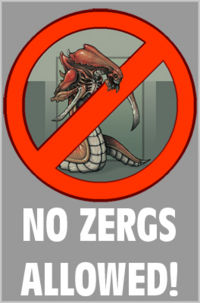Zerging: Difference between revisions
The Rooster (talk | contribs) mNo edit summary |
m (→Usage Notes: correcting) |
||
| Line 33: | Line 33: | ||
== Usage Notes == | == Usage Notes == | ||
The name ''[[Wikipedia:Zerg|Zerg]]'' comes from ''[[Wikipedia:StarCraft|StarCraft]]'', where the [[Wikipedia:Zerg|Zerg]] are one of three playable races. The weakest [[Wikipedia:Zerg|Zerg]], the ''zergling'', is fast and cheap to produce and therefore very well suited for mass rush attacks in the early game. Its | The name ''[[Wikipedia:Zerg|Zerg]]'' comes from ''[[Wikipedia:StarCraft|StarCraft]]'', where the [[Wikipedia:Zerg|Zerg]] are one of three playable races. The weakest [[Wikipedia:Zerg|Zerg]], the ''zergling'', is fast and cheap to produce and therefore very well suited for mass rush attacks in the early game. Its analogy in [[Urban Dead]] is a newly created level-one [[character]]. ''[[Wikipedia:StarCraft|StarCraft]]'' players also use zerglings as decoys and cannon fodder in the mid-late game. | ||
==Related Articles== | ==Related Articles== | ||
Revision as of 14:29, 13 October 2009
Zerging refers to the use of multiple characters, or "alts," in a coordinated manner by a single player.
Zerging is a form of cheating and violates the single, solitary "rule" that Urban Dead's designer (Kevan Davis) has stipulated: that your characters must "lead completely separate existences within the game - your characters should not collaborate, nor share (or stand outside) the same building"[1].
Urban Dead has built-in anti-zerging counter-measures, the triggering of which can result in characters being automatically penalised or even deleted/disabled.
Some players also maintain lists of known and suspected zergers and often punish them in-game. One of the most well-known and popular of these lists can be found on the Resensitized forums.
While the term "zerging" is often used by Urban Dead players to describe all forms of multiple character abuse ("multi abuse"), it technically refers to the use of two or more alts in close proxoimity and in a cooperative manner. Typical zerging activities include: creating multiple zombie alts to attack barricades at the same time; creating surivor alts to attack, revive and/or heal in conjuction; using one alt to "scout ahead" and gather useful intelligence for another alt to act upon. All of these actions violate the rule of leading completely seperate existences within the game.
The article on multi abuse discusses in detail how the two terms -- "zerging" vs. "multi-abuse" -- are used, and how they are often differentiated from each other.
Zerging Problems in Urban Dead
Combat Mobs - A pack of characters that coordinate attacks approach the effect of a 100% one-shot kill. Before the countermeasures, zerging players would create armies of Firefighters or Zombies in a particular suburb and use them to attack a Safehouse. The characters used in the zerging were often abandoned afterwards.
Sentinels - A player places a character in a given building, and leaves them there. They log in every so often, thereby preventing the character from going inactive, and allowing them to check the status of the building. (Whether it's been broken into, whether it's been rebarricaded, and so on.) Upon seeing a change in the building's status, the player then knows the optimal place to move their combat mob so as to maintain whatever status they desire for that building/suburb. Ransack allows a lone zombie sentinel to prevent survivors barricading a ransacked building until it is killed. Although hard to prevent, this is still against the clearly worded game rules which state that characters must lead completely separate existences within the game - your characters should not collaborate. Sharing information between characters (especially where that is the main purpose of the alt) is collaboration.
Implemented Anti-Zerging Countermeasures
Random Start Location - It was initially possible to pick your starting suburb, to be near your friends - this option was removed quite early on.
No Intra-Player Cooperation - The FAQ states that characters found to be cooperating "in a suspicious fashion" will be automatically penalised or banned by the system. Characters from the same IP in close proximity (details deliberately not released) suffer penalties in combat, in using First aid kits, and in search percentages.
IP Limit - The IP limit prevents a single machine from initiating zerg activity. The technical implementation is to allow no more than 160 hits from a single IP address per day.
Unofficial Anti-Zerging Countermeasures
Resensitized runs its own Zerg Liste which relies on screenshots of similarly named characters suspiciously close to one another or admissions of zerging (it happens more than you think) to keep track of and systematically eliminate the cheaters of Malton. The larger PK lists (Resensitized and Rogue's Gallery) don't count bounty claims against players on the Zerg Liste as PKs for their purposes, so Zerg Hunters (such as ZHU) are relatively safe except for the zergers who constantly try to hunt them down in retaliation.
Seems like Zerging
A number of groups, mainly PKers, deliberately choose very similar names in order to give the impression of one person doing all the actions, even though it is a group of players, each controlling a different character. A couple of examples are the Pathetic Bill and SillyLillyPilly groups.
Usage Notes
The name Zerg comes from StarCraft, where the Zerg are one of three playable races. The weakest Zerg, the zergling, is fast and cheap to produce and therefore very well suited for mass rush attacks in the early game. Its analogy in Urban Dead is a newly created level-one character. StarCraft players also use zerglings as decoys and cannon fodder in the mid-late game.
